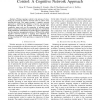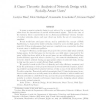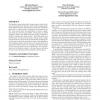108 search results - page 19 / 22 » -Hardness of Pure Nash Equilibrium in Scheduling and Connect... |
IOR
2008
13 years 7 months ago
2008
Wireless sensor networks pose numerous fundamental coordination problems. For instance, in a number of application domains including homeland security, environmental monitoring an...
ICC
2007
IEEE
14 years 1 months ago
2007
IEEE
Abstract— Wireless topology control is the process of structuring the connectivity between network nodes to achieve some network-wide goal. This paper presents a cognitive networ...
INFOCOM
2010
IEEE
13 years 5 months ago
2010
IEEE
—In many scenarios network design is not enforced by a central authority, but arises from the interactions of several self-interested agents. This is the case of the Internet, wh...
CN
2011
13 years 2 months ago
2011
In many scenarios network design is not enforced by a central authority, but arises from the interactions of several self-interested agents. This is the case of the Internet, wher...
ATAL
2010
Springer
13 years 8 months ago
2010
Springer
We introduce a game setting called a joint process, where the history of actions determine the state, and the state and agent properties determine the payoff. This setting is a sp...



